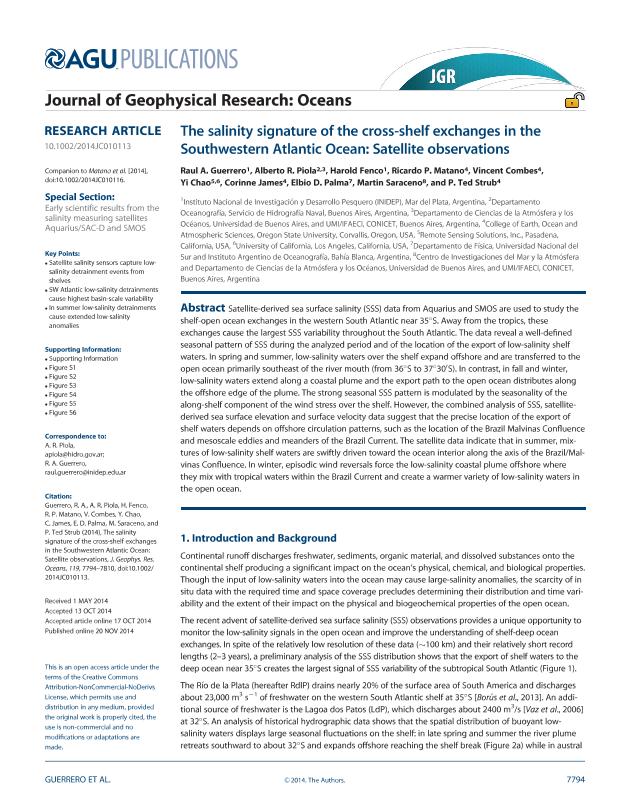Mostrar el registro sencillo del ítem
dc.contributor.author
Guerrero, Raul Alfredo
dc.contributor.author
Piola, Alberto Ricardo

dc.contributor.author
Fenco, Harold
dc.contributor.author
Matano, Ricardo
dc.contributor.author
Combes, Vincent
dc.contributor.author
Chao, Yi
dc.contributor.author
James, Corinne
dc.contributor.author
Palma, Elbio Daniel

dc.contributor.author
Saraceno, Martin

dc.contributor.author
Strub, P. Ted
dc.date.available
2016-03-01T18:47:04Z
dc.date.issued
2014-10
dc.identifier.citation
Guerrero, Raul Alfredo; Piola, Alberto Ricardo; Fenco, Harold; Matano, Ricardo; Combes, Vincent; et al.; The salinity signature of the cross-shelf exchanges in the Southwestern Atlantic Ocean: Satellite observations; Wiley; Journal of Geophysical Research; 119; 11; 10-2014; 7794-7810
dc.identifier.issn
0148-0227
dc.identifier.uri
http://hdl.handle.net/11336/4557
dc.description.abstract
Satellite-derived sea surface salinity (SSS) data from Aquarius and SMOS are used to study the shelf-open ocean exchanges in the western South Atlantic near 35°S. Away from the tropics, these exchanges cause the largest SSS variability throughout the South Atlantic. The data reveal a well-defined seasonal pattern of SSS during the analyzed period and of the location of the export of low-salinity shelf waters. In spring and summer, low-salinity waters over the shelf expand offshore and are transferred to the open ocean primarily southeast of the river mouth (from 36°S to 37°30′S). In contrast, in fall and winter, low-salinity waters extend along a coastal plume and the export path to the open ocean distributes along the offshore edge of the plume. The strong seasonal SSS pattern is modulated by the seasonality of the along-shelf component of the wind stress over the shelf. However, the combined analysis of SSS, satellite-derived sea surface elevation and surface velocity data suggest that the precise location of the export of shelf waters depends on offshore circulation patterns, such as the location of the Brazil Malvinas Confluence and mesoscale eddies and meanders of the Brazil Current. The satellite data indicate that in summer, mixtures of low-salinity shelf waters are swiftly driven toward the ocean interior along the axis of the Brazil/Malvinas Confluence. In winter, episodic wind reversals force the low-salinity coastal plume offshore where they mix with tropical waters within the Brazil Current and create a warmer variety of low-salinity waters in the open ocean.
dc.format
application/pdf
dc.language.iso
eng
dc.publisher
Wiley

dc.rights
info:eu-repo/semantics/openAccess
dc.rights.uri
https://creativecommons.org/licenses/by-nc-nd/2.5/ar/
dc.subject
Salinidad
dc.subject
Atlantico Sur
dc.subject
Rio de La Plata
dc.subject
Confluencia Brasil Malvinas
dc.subject
Plataforma Continental
dc.subject.classification
Oceanografía, Hidrología, Recursos Hídricos

dc.subject.classification
Ciencias de la Tierra y relacionadas con el Medio Ambiente

dc.subject.classification
CIENCIAS NATURALES Y EXACTAS

dc.title
The salinity signature of the cross-shelf exchanges in the Southwestern Atlantic Ocean: Satellite observations
dc.type
info:eu-repo/semantics/article
dc.type
info:ar-repo/semantics/artículo
dc.type
info:eu-repo/semantics/publishedVersion
dc.date.updated
2016-03-30 10:35:44.97925-03
dc.journal.volume
119
dc.journal.number
11
dc.journal.pagination
7794-7810
dc.journal.pais
Estados Unidos

dc.journal.ciudad
Washington
dc.description.fil
Fil: Guerrero, Raul Alfredo. Instituto Nacional de Investigaciones y Desarrollo Pesquero; Argentina
dc.description.fil
Fil: Piola, Alberto Ricardo. Ministerio de Defensa. Armada Argentina. Servicio de Hidrografia Naval; Argentina. Universidad de Buenos Aires. Facultad de Ciencias Exactas y Naturales. Departamento de Ciencias de la Atmósfera y los Océanos; Argentina
dc.description.fil
Fil: Fenco, Harold. Instituto Nacional de Investigaciones y Desarrollo Pesquero; Argentina
dc.description.fil
Fil: Matano, Ricardo. Oregon State University. College of Earth, Ocean and Atmospheric Sciences; Estados Unidos
dc.description.fil
Fil: Combes, Vincent. Oregon State University. College of Earth, Ocean and Atmospheric Sciences; Estados Unidos
dc.description.fil
Fil: Chao, Yi. University of California at Los Angeles; Estados Unidos. Remote Sensing Solutions Inc.; Estados Unidos
dc.description.fil
Fil: James, Corinne. Oregon State University. College of Earth, Ocean and Atmospheric Sciences; Estados Unidos
dc.description.fil
Fil: Palma, Elbio Daniel. Consejo Nacional de Investigaciones Científicas y Técnicas. Centro Científico Tecnológico Bahía Blanca. Instituto Argentino de Oceanografía (i); Argentina. Universidad Nacional del Sur. Departamento de Física; Argentina
dc.description.fil
Fil: Saraceno, Martin. Consejo Nacional de Investigaciones Científicas y Técnicas. Oficina de Coordinacion Administrativa Ciudad Universitaria. Centro de Investigaciones del Mar y la Atmósfera; Argentina
dc.description.fil
Fil: Strub, P. Ted. Oregon State University. College of Earth, Ocean and Atmospheric Sciences; Estados Unidos
dc.journal.title
Journal of Geophysical Research

dc.relation.alternativeid
info:eu-repo/semantics/altIdentifier/url/http://onlinelibrary.wiley.com/wol1/doi/10.1002/2014JC010113/abstract
dc.relation.alternativeid
info:eu-repo/semantics/altIdentifier/doi/http://dx.doi.org/10.1002/2014JC010113
dc.relation.alternativeid
info:eu-repo/semantics/altIdentifier/issn/0148-0227
dc.relation.alternativeid
info:eu-repo/semantics/altIdentifier/url/http://onlinelibrary.wiley.com/doi/10.1002/2014JC010113/full
Archivos asociados
